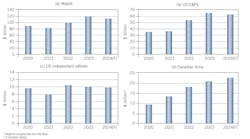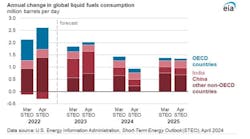OFFSHORE TECHNOLOGY CONFERENCE, HOUSTON�The Gulf of Mexico will be a viable source of future oil and natural gas production�particularly gas. But searching for these much-needed resources will require deeper drilling, continued technological advances, and increased capital and human resources.
These were some of the chief topics discussed by a panel of executives at Offshore Technology Conference in Houston Wednesday.
Technological advances
For large oil firms such as Unocal Corp., says Mike Bell, general manager of deepwater exploration for Unocal, operating in the deepwater Gulf of Mexico with any amount of economic success comes down to two things: the time taken to drill the well and the deliverability of any given prospect.
�Economics in the deep water revolves around the well,� Bell said. �It revolves around how much it costs you to construct that well and how productive that well is.�
Along with this philosophy, said Bell, certain technologies need to be in place in order to succeed as an industry. For Unocal, one technology that will contribute to reducing drilling costs and times is a state-of-the-art deepwater drillship, such as Transocean Sedco Forex Inc.'s Discoverer Spirit.
�One of the things that is required today in the emerging plays of the deepwater gulf is the size and the power to be able to deliver the wells that need to be delivered and to do them in the right amount of time,� Bell said. In addition, �It�s not any good just to possess the technology, you actually have to have the people who can do something with it."
In short, said Bell, �The research and development is happening, the new capability is being delivered, and some people are going to make good use of it, and some folks are going to squander the opportunity. In the doing is the proof, and it all really revolves around �How much do your wells cost and how many barrels are they going to make?��
Technologies such as floating production platforms and vessels will be another advance that will help maximize supplies of oil and gas to shore, said Peter Kinnear, president of FMC Corp.'s petroleum equipment and systems division. With regard to the use of floating production, storage, and offloading vessels (FPSOs) in the gulf, Kinnear said that FPSOs �ought to be approved for use in the Gulf of Mexico.� Kinnear believes that FPSOs could be seen in use in the gulf as early as 2002.
The �new majors�
According to Ocean Energy Inc. Vice-Chairman and Director James Flores, independent firms like Ocean Energy have become the �new majors� in the Gulf of Mexico. The driver behind this phenomenon, says Flores, was that the majors were forced to give up properties in the gulf as a result of restructuring brought on by the prolonged price drought.
It was through gaining such prime prospects, Flores said, that independents were able to gain the attention of Wall Street.
�In 1997, $4 billion of Wall Street money went into seismic and drilling on the shelf Gulf of Mexico,� Flores said. Stronger gas and oil prices will continue to fuel activity in the gulf, Flores says, and in the next 5 years, industry will be standing �on healthier ground.�
Investor confidence
Another concern among the panel was improving relationships with investors and regaining their confidence through larger returns.
Ocean Energy�s Flores said that it was all a matter of �commodity vs. cost.� The oil and gas business is, after all, a margin business, he said. "That�s why we�ve talked about reducing our costs with our contractors, and we�ll pay more for services if we can do it in a shorter period of time...but the commodity margins is what�s going to drive our stock values,� Flores said.
�Within the energy industry spectrum, there have been some areas that have dramatically outperformed others," said panel moderator William Walker, Pres. of Howard Weil Labouisse Friedrichs Inc. Walker said that those �taken out behind the shed� for a beating recently were the independent exploration and production companies, and deservedly so. �Not only did they not make a return [on capital] for a long period of time...they couldn�t even get your capital back to you. So, many of these companies deserved to be punished, but many companies are also painted with the same brush,� he said.
�On the other side of the coin, within the last 6 months, the service companies, as measured by the OSX [oil service index]...have done extremely well,� Walker said. �The market is telling you that there�s some good news coming out there. The area that is the most vulnerable...is the small-cap E&P companies, because [they] have two things going against them that every oil company needs: lack of financing ability and lack of quality drilling prospects.
�As a consequence, the market ultimately saw through that and punished that category of stocks very severely, but there has been a difference in the way majors, independents, and service companies have traded�over the last 6 months, especially,� said Walker.

